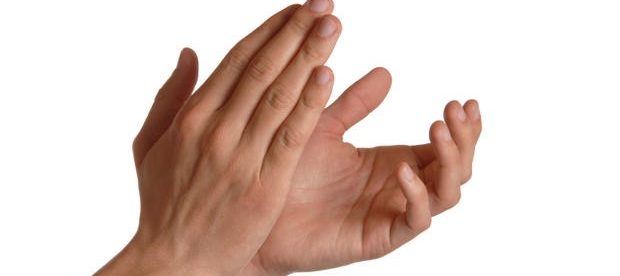The British Ban on Clapping

The American singer Perry Como, beginning in the 1940s and into the 1960s, hosted one of the first musical variety shows on television. But before he took to the airwaves, he performed as part of a traveling orchestra led by Ted Weems, who himself helped establish the big band genre. Together, Como and the Weems Orchestra recorded nearly two dozen songs in the late 1930s and the early 1940s. One of those songs was “Deep in the Heart of Texas,” recorded on December 9, 1941, just two days after the Japanese bombed Pearl Harbor.
Although those two events—the recording of a song about Texas and an attack on Hawaii—seem entirely unrelated, as it turns out, the song played a role in the war effort. But not in Texas, and, for that matter, not in Hawaii. “Deep in the Heart of Texas” became a song of note in Great Britain.
The song is a simple tune lasting just under two minutes. It contains five stanzas, each featuring a pair of items (“The stars at night are big and bright” and “The prairie sky is wide and high” in the first stanza) that are found “deep in the heart of Texas,” as one could easily guess. However the song isn’t known for its lyrics, but rather, the clapping. Before singing “deep in the heart of Texas” each of the ten times one finds it in the song, Como and the orchestra clapped four times. The evocative clapping became the song’s hallmark, as it invited participation from the audience.
The anthem rose to popularity quickly, even outside of Texas. It topped the charts of the U.S. television and radio program Your Hit Parade for five weeks and then went global, gaining traction in the United Kingdom. Bing Crosby covered the song, recording his own version in 1942, which hit number three on the Billboard charts. This version earned a lot of radio play on the BBC and became a favorite of factory workers. Many would momentarily stop their jobs to join in—clap clap clap clap—for the two minutes that the song took over the airwaves.
Which is why it became a problem.
In 2008, the Guardian newspaper revisited this moment in British history. As the paper noted, the British government did not take kindly to wartime workers taking impromptu breaks due to what they heard on the radio, so it took action. The BBC ruled that “Deep in the Heart of Texas” was not allowed to be broadcast “on programs that might be heard by factory workers, who might neglect their lathes to join in the song’s clapping routine.” The ban was lifted before the war ended.
Bonus fact: In August 1962, American singer Bobby “Boris” Pickett released the Halloween novelty song “Monster Mash” and found solid success. The song—his only hit—reached the top of the U.S. Billboard chart on October 20 of that year. But it took more than a decade to reach similar success in the UK. Why? Because in 1962, the BBC banned the song from the airwaves, claiming it was “too morbid.” When the song was re-released in 1973, the BBC changed its tune, and “Monster Mash” rose to number three on the UK charts.
From the Archives: A Former Nation, Dividing: Can Texas split up into multiple nations? Kind of, sort of, but not really.
